Construction Contract Agreement Samples
-

Factory Construction Contract Agreement
download now -

Joint Venture Construction Contract Agreement
download now -

Construction Material Contract Agreement
download now -

Apartment Construction Contract Agreement
download now -
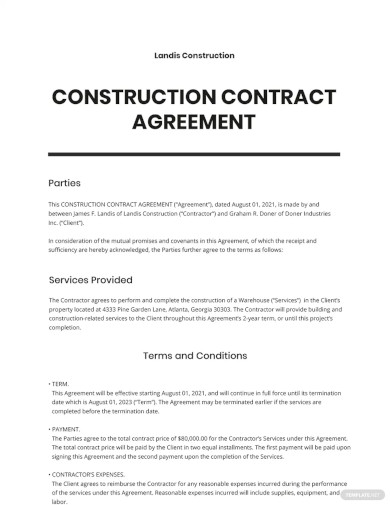
Construction Contract Agreement Template
download now -

Construction Contractor Contract Agreement
download now -
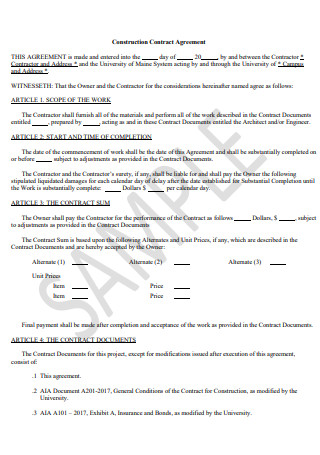
Sample Construction Payment Contract Agreement
download now -
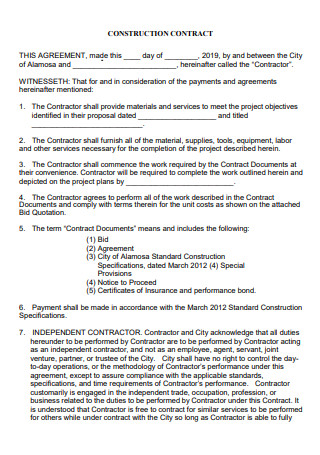
Basic Construction Work Contract Agreement
download now -
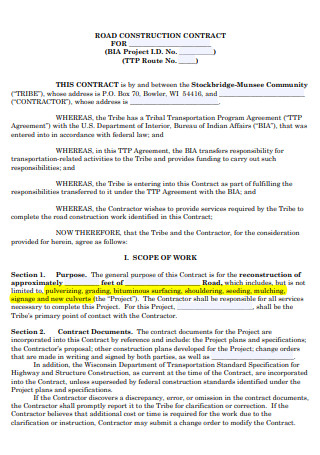
Road Construction Contract Agreement
download now -
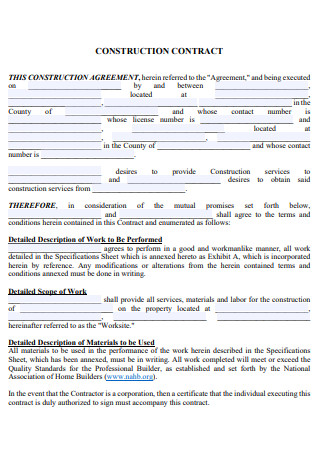
Formal Subcontractor Construction Contract Agreement
download now -
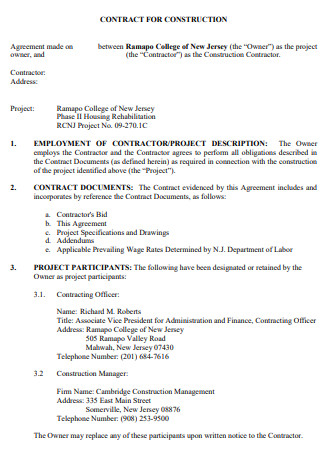
Construction Contract Building Agreement Example
download now -
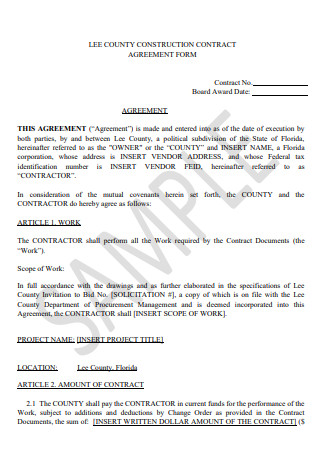
Construction Remodeling Contract Agreement Form
download now -
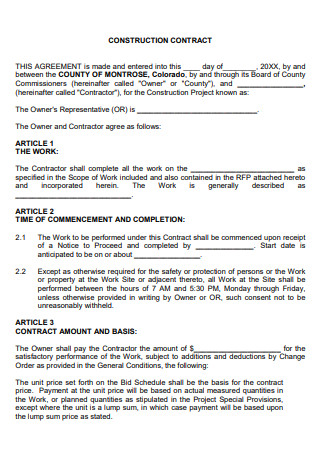
Printable Construction Document Contract Agreement
download now -
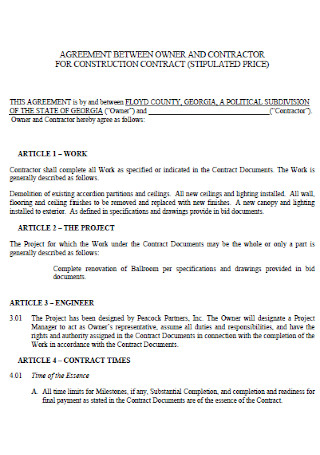
Standard House Construction Contract Agreement
download now -
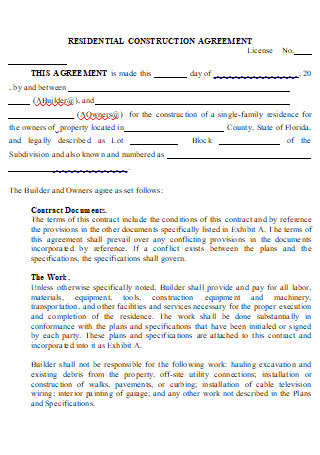
Residential Construction Termination Contract Agreement
download now -
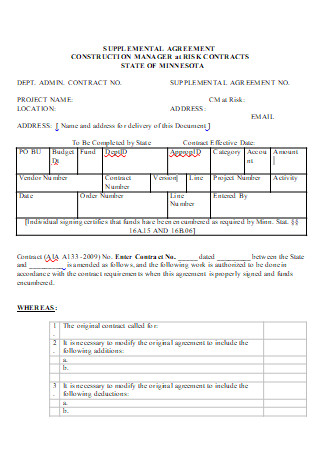
Construction Contract Agreement in DOC
download now
FREE Construction Contract Agreement s to Download
Construction Contract Agreement Format
Construction Contract Agreement Samples
What is a Construction Contract Agreement?
Parts of a Construction Contract Agreement
How to Create a Construction Contract Agreement
FAQs
When do you need to use a construction contract agreement?
What are the consequences of not using a construction contract agreement?
How can construction contract agreements protect a contractor’s business?
What are the key elements of a Construction Contract Agreement?
Who should draft a Construction Contract Agreement?
What happens if either party breaches the agreement?

Download Construction Contract Agreement Bundle
Construction Contract Agreement Format
This Construction Contract Agreement (hereinafter referred to as the “Agreement”) is made and entered into as of the [Date], by and between:
[Owner’s Name], residing at [Owner’s Address] (hereinafter referred to as the “Owner”),
and
[Contractor’s Name], having its principal place of business at [Contractor’s Address] (hereinafter referred to as the “Contractor”).
RECITALS
WHEREAS, the Owner desires to have certain construction work performed on the property located at [Property Address];
WHEREAS, the Contractor agrees to perform such construction work as specified in this Agreement;
NOW, THEREFORE, in consideration of the mutual promises herein contained, the parties agree as follows:
1. Scope of Work
The Contractor shall perform the construction work described in Exhibit A attached hereto and made a part of this Agreement (hereinafter referred to as the “Work”). The Contractor agrees to furnish all labor, materials, equipment, and services necessary to complete the Work.
2. Contract Price
The total contract price for the Work shall be [Total Contract Price], payable in the following installments:
- [Amount] upon signing of this Agreement.
- [Amount] upon completion of [Milestone/Phase].
- Final payment of [Amount] upon completion of the Work and acceptance by the Owner.
3. Duration of Work
The Contractor agrees to commence the Work on [Start Date] and complete the Work by [Completion Date]. Time is of the essence in this Agreement.
4. Change Orders
Any changes to the Scope of Work must be documented in a written change order signed by both parties. Changes may affect the Contract Price and/or Completion Date.
5. Permits and Approvals
The Contractor shall obtain all necessary permits and approvals required to perform the Work.
6. Insurance
The Contractor shall maintain the following insurance coverage during the term of this Agreement:
- General Liability Insurance: [Coverage Amount]
- Workers’ Compensation Insurance: [As Required by Law]
The Contractor shall provide proof of insurance to the Owner upon request.
7. Warranties
The Contractor warrants that all Work will be performed in a workmanlike manner and in compliance with applicable laws and codes. The Contractor also warrants that all materials used in the Work will be of good quality.
8. Termination
Either party may terminate this Agreement upon written notice to the other party if the other party breaches any material term of this Agreement. Upon termination, the Owner shall pay the Contractor for all Work completed up to the date of termination.
9. Indemnification
The Contractor agrees to indemnify and hold the Owner harmless from any claims, damages, or liabilities arising from the Contractor’s performance of the Work, except to the extent caused by the Owner’s negligence.
10. Dispute Resolution
In the event of a dispute arising under this Agreement, the parties agree to first attempt to resolve the dispute through mediation. If mediation fails, the dispute shall be resolved by binding arbitration in accordance with the rules of the [Arbitration Organization].
11. Governing Law
This Agreement shall be governed by and construed in accordance with the laws of the State of [State Name].
12. Entire Agreement
This Agreement constitutes the entire agreement between the parties and supersedes all prior agreements or understandings, whether written or oral.
IN WITNESS WHEREOF, the parties have executed this Agreement as of the date first written above.
OWNER:
Name: __________________________
Signature: ______________________
Date: __________________________
CONTRACTOR:
Name: __________________________
Signature: ______________________
Date: __________________________
What is a Construction Contract Agreement?
A Construction Contract Agreement is a formal document outlining the terms and conditions under which construction work will be performed. It sets the scope, responsibilities, and expectations of both the client and the contractor. This agreement minimizes misunderstandings and protects both parties from potential disputes. It includes project specifics, financial terms, and legal obligations, ensuring accountability and compliance. You can also see more on Construction Contracts.
Parts of a Construction Contract Agreement

Depending on the project plan, each contract varies from one another. The only modification concerns the scope of work, costs, and other essentials depending on the nature of the job. However, each construction contract agreement must have the following components to protect both parties.
How to Create a Construction Contract Agreement

Various construction contract agreements must cater to different clients depending on the scope of work a client intends to happen. In most states, it is mandatory to have a written contract in place. Here are helpful steps in creating a construction contract agreement.
Step 1: Describe the Type of Work to Be Accomplished
State the exact description of the work you have to accomplish as a contractor. It must detail the materials, tools, or equipment you intend to use during the duration of the contract. It is advantageous to be as specific and comprehensive as possible. You can also see more on New Construction Agreement.
Step 2: Include All Necessary Financing Details
Ensure that you indicate the agreed amount that you and the client agreed upon during negotiations for the pay they intend to give for the work you put in to achieve project completion. State the contract price, non-refundable security deposit, payment schedules, final payment price and date, and interest payments to aid the understanding of the client.
Step 3: Indicate the Due Dates and Necessary Fees
Always be clear about your intended payment installment dates. If you agreed on charging late fees, the contract agreement must detail the amount and date the client must pay these charges. Also, explain how you plan to handle the expected costs. Whether you shoulder the expenses or the other party pays for the increase. It is also necessary to outline how the parties intend to handle the addition and deduction processes in the contract. You can also see more on Building Construction Agreement.
Step 4: Describe the Handling Process of Adjustments
Indicate terms and provisions that protect you from unnecessary and unexpected work requests from your client and any additional costs. There must be a section that affirms an understanding of change orders and claims.
Step 5: Agree On the Means of Resolving Disputes
Select an ideal discussion or authority to resolve disputes and claims regarding your work performance or completion. It is also helpful to include stipulations that require resolutions in terms of binding negotiations. In doing so, both parties are waiving their rights to file lawsuits, but it helps to arbitrate disputes faster, privately, and inexpensively.
Step 6: Identify Coverage Information
Indicate that it is your responsibility to provide liability insurance and worker compensation for the length of the construction project as required by law. It is also essential to state your licensing information and offers the owner the right to ask for a performance and payout bond. You can also see more on Building Contract.
FAQs
When do you need to use a construction contract agreement?
A construction contract agreement is necessary for building, renovating, or altering a building or structure. Both parties must have an agreement in writing that acts as a roadmap until the completion of the construction project. It also allows the parties to designate essential roles that include obtaining permits, providing materials, buying fixtures, and paying for utilities. The construction process involves plenty of moving mechanisms that define each party’s responsibility to complete the project.
What are the consequences of not using a construction contract agreement?
The success of a construction project or construction plan depends on clearly defined expectations and schedules. Mistakes and delays affect both parties negatively, resulting in additional costs for labor and equipment because the property is left unused in the intended time and purpose. A construction contract agreement holds a liquidation damages clause that indicates a set amount that the contractor must pay to the client for each delay per day. The document also prevents issues like poor performance, work changes, early termination, lost profits, and imbalanced risk allocations for both parties. You can also see more on Construction Investment Agreement.
How can construction contract agreements protect a contractor’s business?
Having a well-written and comprehensive construction contract agreement helps get you and your client on the same page with the desired construction outcome. It helps protect you from any legal disputes, disagreements, issues about payments, and other relating concerns. It is necessary to have all the essential provisions and clauses for the extra layer of protection you and your company need to complete the project and move on to the next one.
What are the key elements of a Construction Contract Agreement?
Key elements include the scope of work, timelines, payment terms, legal clauses, and safety compliance provisions. You can also see more on Construction Partnership Agreement.
Who should draft a Construction Contract Agreement?
It can be drafted by either the client or the contractor, often with the assistance of a legal expert to ensure compliance and protection.
What happens if either party breaches the agreement?
In the event of a breach, the agreement will dictate the course of action, which may include penalties, termination of the contract, or legal proceedings. The clauses protect the non-breaching party’s rights. You can also see more on Pre-Construction Agreement.
